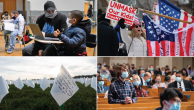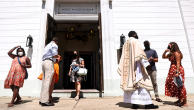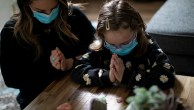58% favor vaccine requirement for air travel, but fewer back requiring vaccines to dine or shop
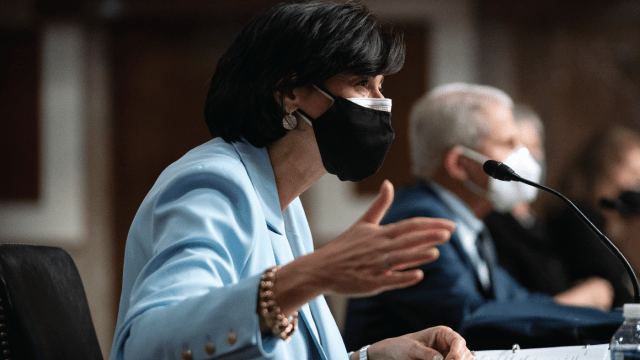
Pew Research Center conducted this study to understand how Americans are continuing to respond to the coronavirus outbreak. For this analysis, we surveyed 10,237 U.S. adults from Jan. 24 to 30, 2022.
Everyone who took part in the survey is a member of the Center’s American Trends Panel (ATP), an online survey panel that is recruited through national, random sampling of residential addresses. This way, nearly all U.S. adults have a chance of selection. The survey is weighted to be representative of the U.S. adult population by gender, race, ethnicity, partisan affiliation, education and other categories. Read more about the ATP’s methodology.
Here are the questions used for this report, along with responses, and its methodology.
Nearly two years after the coronavirus outbreak took hold in the United States, Americans are increasingly critical of the response to COVID-19 from elected officeholders and public health officials.
Amid debates over how to address the surge in cases driven by the omicron variant, confusion is now the most common reaction to shifts in public health guidance: 60% of U.S. adults say they’ve felt confused as a result of changes to public health officials’ recommendations on how to slow the spread of the coronavirus, up 7 percentage points since last summer.
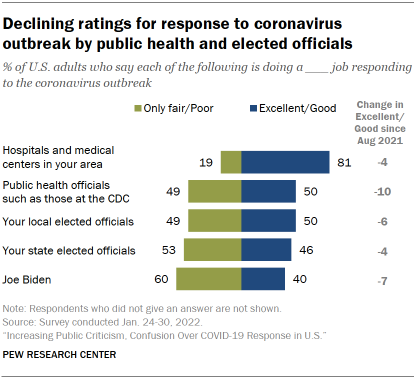
Americans are now almost evenly divided over how well public health officials, such as those at the Centers for Disease Control and Prevention, are responding to the outbreak, with about half (49%) saying they are doing an only fair or poor job and half (50%) saying they are doing an excellent or good job. Positive ratings of public health officials have fallen 10 points since August and are well below ratings for their initial response to the outbreak in early 2020.
Evaluations of elected leaders at all levels of government have also moved lower. A majority (60%) now describes the job Joe Biden is doing responding to the coronavirus as only fair or poor. The share of Americans who say Biden is doing an excellent or good job (40%) is down 7 points since August and is now only slightly higher than the share who said Donald Trump did an excellent or good job responding to the coronavirus outbreak over the course of his presidency (36%).
The new Pew Research Center survey finds that 78% of U.S. adults say they have received at least one dose of a COVID-19 vaccine, including 73% who say they are fully vaccinated – having received either two Pfizer or Moderna vaccines or one Johnson & Johnson. Among fully vaccinated adults, 66% say they’ve received an additional COVID-19 “booster shot” within the past six months (this group makes up 48% of all U.S. adults). When it comes to the decision to get a vaccine:
- Democrats and those who lean to the Democratic Party are much more likely than Republicans and Republican leaners to say they have received at least one dose of a COVID-19 vaccine (90% vs. 64%).
- Among fully vaccinated adults, partisan differences persist for booster shots: 73% of fully vaccinated Democrats say they’ve gotten a COVID-19 booster shot within the last six months, compared with 55% of fully vaccinated Republicans.
Among Republicans, the decision to get a vaccine, as well as broader views on the outbreak, differ across key demographics and characteristics. For instance, age and education strongly shape the vaccine decision among Republicans:
- Eight-in-ten Republicans ages 65 and older (80%) have received at least one dose of a coronavirus vaccine. Lower shares of Republicans ages 50 to 64 (62%), 30 to 49 (57%) and 18 to 29 (52%) say the same.
- Republicans with a postgraduate degree are 24 points more likely than those with a high school diploma or less education to have received a COVID-19 vaccine (81% vs. 57%). These differences are more modest among Democrats.
With vaccines widely available, businesses and institutions are grappling with whether to require proof of COVID-19 vaccination to participate in a range of activities. The survey finds:
- A majority of Americans (58%) favor requiring proof of COVID-19 vaccination for air travel. By relatively narrow margins, more favor than oppose vaccine requirements to go to a sporting event or concert (53% to 46%) and to attend public colleges and universities in person (52% to 47%).
- There is less support for vaccine requirements for more routine activities: 53% oppose a vaccine requirement for eating in a restaurant, and 59% oppose requiring proof of COVID-19 vaccination for shopping in stores and businesses.
Partisan gaps on vaccine requirements are among the largest of any seen in the survey. Majorities of Republicans oppose vaccine requirements for all five activities listed in the survey, while majorities of Democrats favor them. For instance, 76% of Democrats favor requiring proof of COVID-19 vaccination to attend a sporting event or concert, compared with just 26% of Republicans.
Not surprisingly, unvaccinated adults broadly oppose all vaccine requirements, while those who have received a vaccine support most of these measures.
Views on vaccine requirements highlight how partisanship and vaccine status are intertwined, yet both factors play a role shaping views. Among Republicans, those who have received a vaccine are more open to vaccination requirements than those who have not received a vaccine. On air travel, for example, 43% of Republicans who have received a vaccine say they would favor requiring proof of vaccination to travel by plane. Just 9% of Republicans who have not received a vaccine favor this.
One big change seen in the new survey is the increased comfort Americans express around everyday activities. Large shares now say they are comfortable visiting with close family and friends in their home (85%) and going to the grocery store (84%). Majorities also say they feel comfortable visiting a hair salon or barbershop (73%) or eating out in a restaurant (70%). Comfort levels with most activities in the survey are roughly 20 percentage points higher than in November of 2020, before the availability of COVID-19 vaccines in the U.S.
- Notably, unvaccinated adults are more comfortable than vaccinated adults with a range of activities. For instance, 62% of those not vaccinated say they feel comfortable attending an indoor sporting event or concert, compared with just 37% of adults who have received at least one dose of a COVID-19 vaccine.
In part, these gaps in comfort tie to the finding that adults who have not received a vaccine are less concerned than vaccinated adults about getting a serious case of the coronavirus themselves. This has been the case throughout the outbreak. Levels of personal concern about the disease have been one of the core factors tied to the decision of whether or not to get vaccinated since vaccines became widely available.
These are among the principal findings from Pew Research Center’s survey of 10,237 U.S. adults conducted from Jan. 24 to 30, 2022, on the coronavirus outbreak and Americans’ views of a COVID-19 vaccine.
Vaccination rates among U.S. adults
The rise in cases spurred by the omicron variant put renewed focus on vaccination rates in the U.S. as well as the role booster shots play in limiting the impacts from the coronavirus.
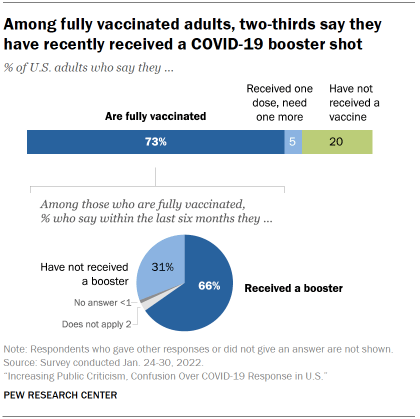
Overall, 78% of U.S. adults say they have received at least one dose of a COVID-19 vaccine, including 73% who say they are fully vaccinated (5% say they’ve received one shot, but need one more). According to the Centers for Disease Control and Prevention (CDC), “fully vaccinated” means having received two doses of Pfizer or Moderna vaccines or one dose of the Johnson & Johnson.
Two-in-ten U.S. adults say they have not received a vaccine for COVID-19. These estimates generally align with other national public opinion surveys, including those conducted by the Kaiser Family Foundation.
When it comes to booster shots, the current survey finds that 66% of adults who are fully vaccinated against COVID-19 say they have also received a booster shot within the last six months. This group makes up 48% of all U.S. adults.
There continue to be sizable differences across groups in the shares who say have received at least one dose of a COVID-19 vaccine (78% of all U.S. adults).
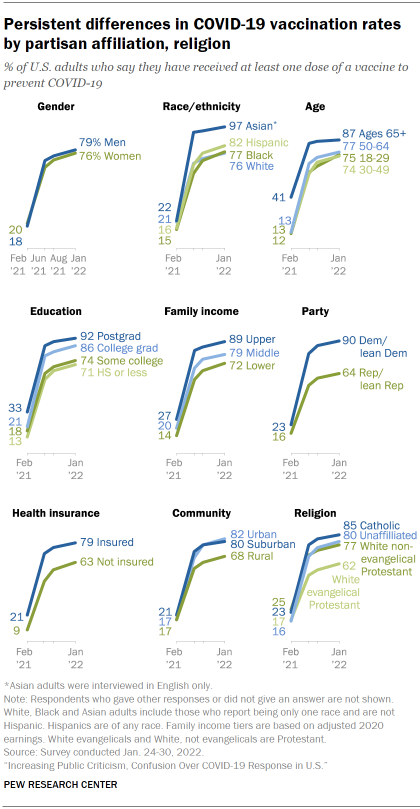
Among the largest differences is partisan affiliation: Democrats and those who lean to the Democratic Party are 26 percentage points more likely than Republicans and Republican leaners to say they’ve received a COVID-19 vaccine (90% vs. 64%).
White evangelical Protestants continue to be less likely than other major religious groups to say they have gotten vaccinated for COVID-19. About six-in-ten White evangelical Protestants (62%) have received at least one dose of a COVID-19 vaccine, compared with 77% of White non-evangelical Protestants, 80% of religiously unaffiliated adults and 85% of Catholics.
Those with higher levels of education and income are more likely than those with lower levels to say they have received a vaccine for COVID-19. And those with health insurance are 16 points more likely than those without to have gotten a vaccine.
Some demographic differences in vaccination status are more pronounced within one partisan group than another. For instance, 80% of Republicans ages 65 and older say they have received a COVID-19 vaccine, compared with far fewer Republicans 18 to 29 (52%). There is a much more modest gap between the shares of Democrats 65 and older and those 18 to 29 who say they’ve received a vaccine (94% vs. 88%). See the Appendix for more details on vaccination status within partisan groups.
Partisan differences in the share who’ve received a booster shot or would be willing to do so every six months
Among those who are fully vaccinated against COVID-19, Democrats and Democratic leaners are more likely to say they’ve received a booster shot within that last six months than Republicans and GOP leaners.
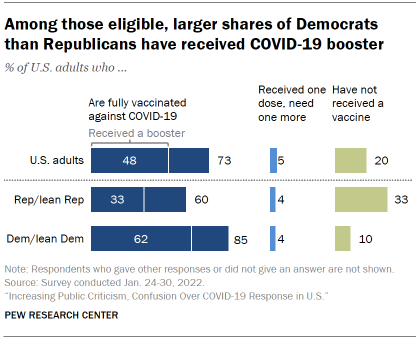
About three-quarters of fully vaccinated Democrats (73%) say they have received a COVID-19 booster shot within the last six months. This group makes up 62% of all Democrats.
Among fully vaccinated Republicans, 55% say they have received a COVID-19 booster shot within the last six months (33% of all Republicans).
Public health experts are continuing to evaluate whether to recommend regular COVID-19 booster shots.
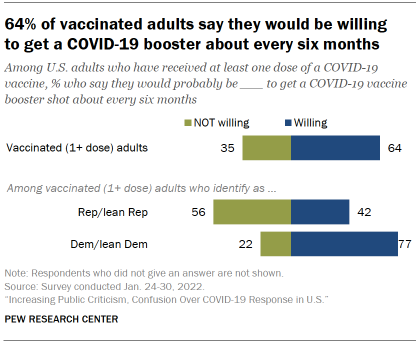
The survey finds that 64% of adults who have received a COVID-19 vaccine say they would probably be willing to get a vaccine booster about every six months, if public health officials recommended it; 35% of vaccinated adults say they probably would not be willing to get a booster shot every six months or so.
Among adults who have received a COVID-19 vaccine, Democrats and Democratic-leaning independents are far more likely than Republicans and Republican leaners to say they’d be willing to get a booster shot regularly (77% vs. 42%).
High marks for hospitals and medical centers, but criticism of top officials’ COVID-19 response grows
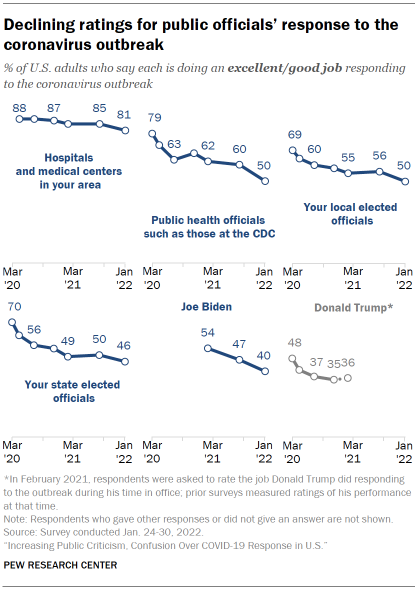
A large majority of Americans (81%) continue to say hospitals and medical centers in their area are doing an excellent or good job responding to the coronavirus.
Ratings are far less positive for the performance of public health officials and elected officeholders at the state, local and federal level.
Half of Americans now say public health officials, such as those at the CDC, are doing an excellent or good job responding to the outbreak, down from a high of 79% early in the outbreak and from 60% last August.
The same share (50%) say their local elected officials are doing an excellent or good job responding to the coronavirus outbreak, and 46% say this about their state elected officials. Ratings for both groups are down since August and are much lower than they were at earlier stages of the outbreak.
Four-in-ten say Joe Biden is doing an excellent or good job dealing with the coronavirus, compared with 60% who say he is doing an only fair or poor job. Positive ratings for Biden’s performance dealing with the coronavirus have continued to decrease, down 7 percentage points since August and 14 points since February 2021, shortly after his inauguration as president. The share of Americans with a positive view of Biden’s handling of the coronavirus outbreak is now nearing that for Trump after he left office (36%).
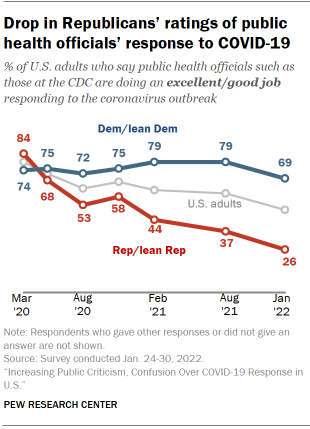
Republicans are especially critical of the response to the coronavirus outbreak by public health officials. Just 26% of Republicans and Republican leaners say public health officials, such as those at the CDC, are doing an excellent or good job; a majority (73%) say they are doing an only fair or poor job. By contrast, 69% of Democrats and Democratic leaners rate the job health officials are doing as excellent or good.
This contrasts with views of public health officials measured in the early stages of the coronavirus outbreak. For instance, in May of 2020, during Trump’s administration, 68% of Republicans and 75% of Democrats said public health officials were doing an excellent or good job responding to the outbreak.
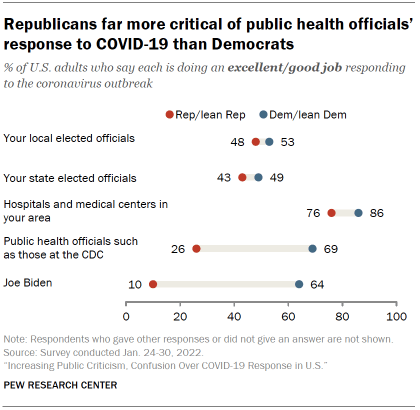
Partisans continue to offer starkly different ratings of Biden’s response to the coronavirus outbreak: 64% of Democrats now say he is doing an excellent or good job, while 89% of Republicans say instead that he is doing an only fair or poor job.
Partisan gaps are more modest in ratings of state and local elected officials, and majorities of both Republicans (76%) and Democrats (86%) say hospitals and medical centers in their area are doing an excellent or good job responding to the coronavirus outbreak.
Changing public health guidance sparks confusion, concern
Americans have encountered a number of changes to public health guidelines about how to slow the spread of the coronavirus in the U.S. over the past two years.
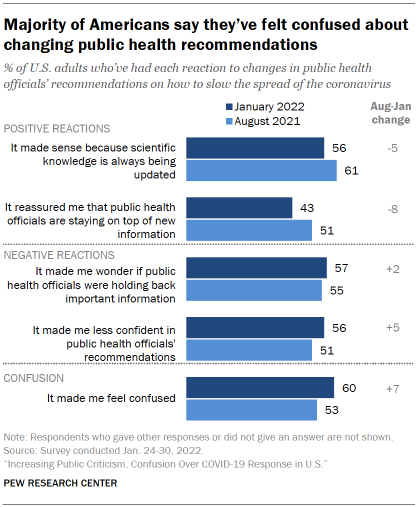
When asked how they’ve felt about these changes, confusion is the top reaction Americans express: 60% say they have felt confused by changes in recommendations on how to slow the spread of the coronavirus, up 7 percentage points from the share who said this in August 2021.
Nearly as many (57%) say changes in health officials’ recommendations on how to slow the spread made them wonder if public health officials were holding back important information. And 56% say it made them feel less confident in the recommendations. The share saying they’ve felt less confident in public health officials’ recommendations is up 5 points since August.
Changing health guidance has also prompted some positive reactions from the public: 56% say they’ve felt that these changes made sense because scientific knowledge is always being updated. Still, the share who say they’ve felt this way is down 5 points since last summer. Fewer Americans (43%) say changes to health officials’ recommendations on how to slow the spread of the coronavirus made them feel reassured that officials were staying on top of new information, down 8 points since August.
Vaccinated adults express much more positive reactions to changing public health guidance on how best to slow the spread of the coronavirus than adults who have not received a vaccine. Partisan affiliation also strongly shapes views, with Democrats taking a more positive view of changes in recommendations than Republicans.
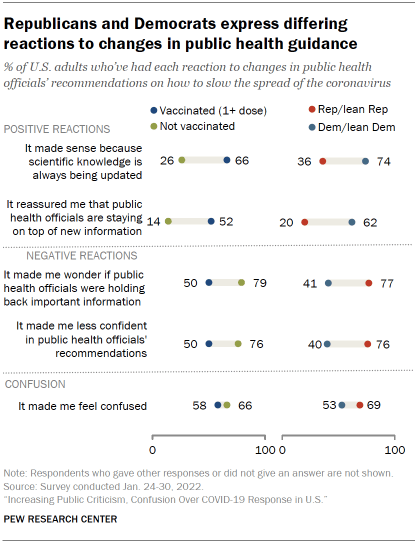
Two-thirds (66%) of adults who have received a COVID-19 vaccine say changes in recommendations have made sense because scientific knowledge is always being updated; just 26% of adults who have not received a vaccine express this view.
Negative reactions register more widely with adults who have not received a vaccine than those who have. Still, 50% of vaccinated adults say changes in guidance on how to slow the spread of the coronavirus have made them less confident in health officials’ recommendations, and 58% say they’ve made them feel confused.
Democrats and Democratic leaners are 38 points more likely than Republicans and Republican leaners to say changes in officials’ coronavirus recommendations have made sense because scientific knowledge is always being updated (74% vs. 36%). About three-quarters of Republicans say changes in guidance have made them wonder if public health officials were holding back important information and made them less confident in health officials’ recommendations (about four-in-ten Democrats express each of these reactions).
The partisan gap is more modest when it comes to confusion: 69% of Republicans and 53% of Democrats say they’ve felt confused due to changes in public health officials’ coronavirus recommendations.
Americans now more comfortable with a range of daily activities
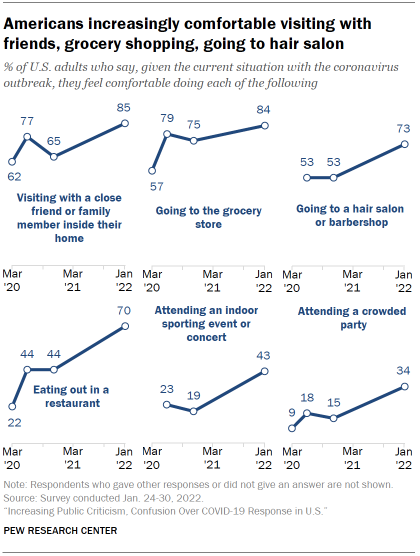
Americans are now much more comfortable with a range of daily activities than they were in November 2020, before the availability of COVID-19 vaccines in the U.S.
Most Americans (85%) now say they feel comfortable visiting with a close friend or family member inside their home, up 20 percentage points from the share who said this in November 2020. About as many (84%) say they feel comfortable going to the grocery store.
Majorities also say they are now comfortable going to a hair salon or barbershop (73%) or eating out in a restaurant (70%). In late 2020, far smaller shares of Americans felt comfortable doing these activities (53% and 44%, respectively).
Still, fewer than half say they feel comfortable attending an indoor sporting event or concert (43%) or a crowded party (34%), though these percentages have risen substantially since November 2020.
The 20% of U.S. adults who have not received a vaccine are less likely than vaccinated adults to see the coronavirus outbreak as a major threat to their own personal health. Consistent with lower levels of concern, unvaccinated adults tend to express more comfort with public activities than those who have received a COVID-19 vaccine.
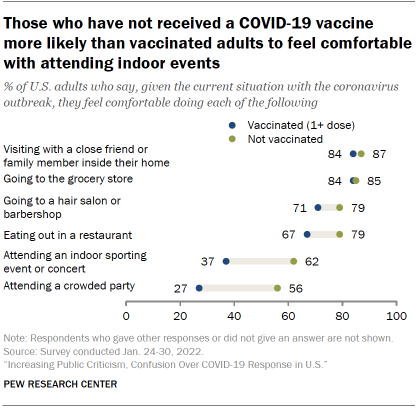
For example, about six-in-ten (62%) of those who are not vaccinated say they feel comfortable attending an indoor sporting event or concert, compared with 37% of vaccinated adults. Unvaccinated adults are 29 points more likely than vaccinated adults to say they’re comfortable attending a crowded party and somewhat more likely to say they’re comfortable eating in a restaurant and going to a hair salon or barbershop.
Large shares of both vaccinated and unvaccinated adults now say they’re comfortable visiting with a close friend or family member inside their home and going to the grocery store.
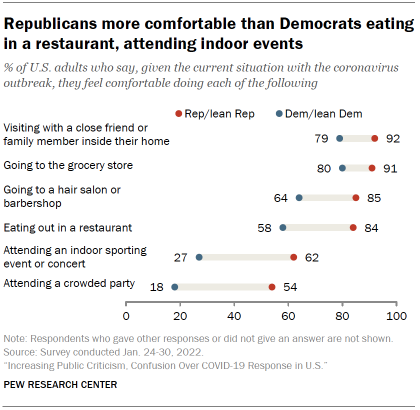
Partisan affiliation also shapes views on this question, with Republicans and those who lean to the Republican Party more likely than Democrats and Democratic-leaning independents to say they feel comfortable engaging in a variety of activities.
A majority of Republicans (62%) say they are comfortable attending an indoor sporting event or concert, compared with about three-in-ten Democrats (27%). There’s a similar gap in comfort with attending a crowded party.
Large shares of both Republicans and Democrats say they are comfortable visiting with a close friend or family member inside their home or going to the grocery store, though the size of the majority is about 10 points higher among Republicans than Democrats in both cases.
Mask wearing increased with the arrival of the omicron variant
A separate early-January survey found the share of U.S. adults who say they have worn a mask all or most of the time in stores and businesses over the last month increased from 53% in August of 2021 to 61% in January. Those who have received a COVID-19 vaccine (70%) continue to be far more likely than those who have not (32%) to say they’ve been wearing a mask in public places regularly. See Appendix for more details.
Majority of Americans favor vaccine requirement for air travel, but not for shopping or dining
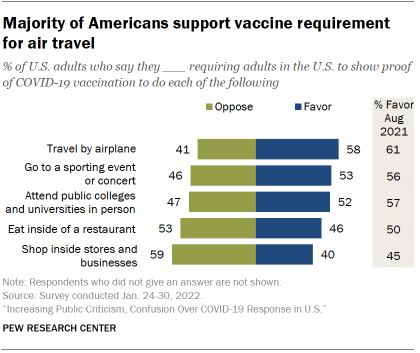
A majority of U.S. adults (58%) favor requiring proof of COVID-19 vaccination before being allowed to travel by air.
Slightly more Americans favor (53%) than oppose (46%) a vaccine requirement to go to a sporting event or concert.
By 52% to 47%, more also favor than oppose requiring proof of COVID-19 vaccination for attending public colleges and universities in person. Support for this proposal is 5 percentage points lower than it was in August of 2021.
Americans lean against requiring proof of vaccination to eat inside of a restaurant (53% oppose, 46% favor), and 59% oppose requiring proof of vaccination to shop inside stores and businesses. Support for both of these proposals has also declined slightly since last summer.
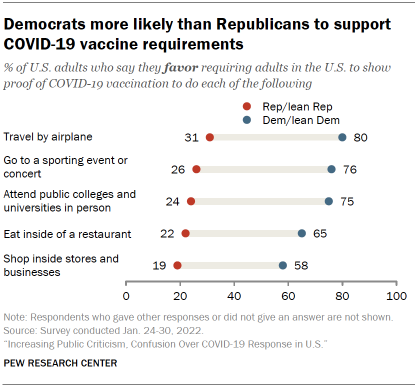
Unsurprisingly, Americans who have not received a coronavirus vaccine are overwhelmingly against vaccine requirements, with around eight-in-ten or more opposing each of these measures.
There continue to be large partisan differences in how Americans view vaccination requirements. Majorities of Democrats favor requiring proof of vaccination status to do each of the five activities listed, while majorities of Republicans oppose requirements in each of these cases.
For example, eight-in-ten Democrats and independents who lean toward the Democratic Party favor requiring those traveling by airplane to show proof of vaccination, while only about three-in-ten (31%) Republicans and Republican leaners say they favor this.

Among Republicans, opposition to vaccine requirements is far more widespread among those who have not received a COVID-19 vaccine than among those who have. For instance, 43% of vaccinated Republicans favor requiring proof of COVID-19 vaccination for air travel, compared with just 9% of unvaccinated Republicans who say this. (Overall, 64% of Republicans and Republican leaners have received at least one dose of a COVID-19 vaccine; 33% have not.)
